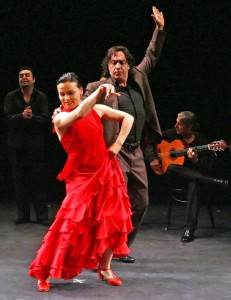Flamenco Program Honors the Vets
The Madrid-based Flamenco group Noche Flamenca celebrated its 16th season in New York with a featured piece on the Abraham Lincoln Brigade last January. The small ensemble (3 guitarists, 2 singers, and 4 dancers) espouses a pure, authentic form of Flamenco known to very few outside of the Iberian Peninsula. Their mission is to educate audiences worldwide to this very passionate and non-commercial form, which has its roots in 15th century Andalusia.
Martín Santangelo, the artistic director of Noche Flamenca, calls the Flamenco form “a primal scream.” The music evolved against the background of an epic tragedy in Spanish history: the expulsion of the Moors from Granada and the ensuing persecution, humiliation, and slaughter of Spanish Jews, Arabs, and Gypsies that followed. Flamenco evolved as the physical and musical expression of this horror. As historian Felix Grande writes: “If we do not relate the music . . . to brutality, repression, hunger, fear, menace, inferiority, resistance and secrecy, then we shall not find the reality of cante flamenco . . . it is a storm of exasperation and grief.”
This year Santangelo and Soledad Barrio, his wife, co-founder, and star of the troupe, recognize the resonance of this period with the terror of the Spanish Civil War and the 40 years of Franco’s brutal dictatorship. The featured piece in their program, “ALBA,” is a riveting, emotional tribute to the Abraham Lincoln Brigade, based on the poem “To the International Soldier Fallen in Spain,” by  Miguel Hernandez.
Miguel Hernandez.
“ALBA” begins with a passionate lament expressed by two guitars and two male voices, Manuel Gago (tenor) and Miguel Rosendo (baritone). The dancers enter the low-lit stage led by Soledad Barrio, the sole female performer. As she kneels beside the spot (or perhaps a grave) where a Brigader has fallen, canes are silently passed from one dancer to another down the line of grieving figures until each holds one, straight and firm, on the cold ground. Suddenly, they strike the floor in unison, and the dancers explode into action. The canes’ violent syncopations are echoed by the dancers’ traditional footwork.
In a recent interview for The Volunteer, Santangelo described the symbolism of the canes: “They are the bones of the fallen, and as the Hernandez poem ends ‘around your bones, the olive groves will grow, unfolding their iron roots in the ground, embracing men universally, faithfully.’”
As the dancers move with increasing speed and intensity, intersecting and interacting in individual percussive rhythms, their feet, the guitars, and the voices combine to sound like bullets exploding and bodies falling. The emotional moments topple over one another. Moods change unexpectedly, often separated by frozen moments of incredible tension. It is, alternately, an expression of the fury of war, courage, the resolve of freedom fighters, and the grief of a nation. Packed houses respond to the troupe’s intensity with calls of “Ole” throughout the performance and, at the conclusion, a standing ovation!
A solo by guitarist Jesus Torres, who has been with the company for many years, is a perfect, quiet and contemplative antidote to “ALBA.” In a magical moment, guitarists Salva de María and Eugenio Iglesias enter upstage and sit in the shadows, listening with the audience. Then Mr. Torres rises to leave, his hands stilled, but the music mysteriously continues. It is a seamless transition between the guitarists, which introduces the next piece, a slow, beautiful and sensual dance of love choreographed by Soledad Barrio and performed by her and Noe Barroso. Two more virtuoso dance solos, performed with enormous energy, elegance, and an attitude of defiance by Antonio Jimenez and Juan Ogalla, complete the first part of the program.
The three pieces after the intermission are just as powerful as those that come before. Each dancer is featured in equal measure with Soledad Barrio’s exquisite solo piece, eagerly awaited by the adoring crowd. The standing ovations demand a short encore, and the audiences leave the theater nearly as energized and exhausted as the performers.
Many in the audience for the three-week run were from the ALBA community. On the last day of performance in New York City, Abraham Lincoln volunteer Matti Mattson attended. Mr. Santangelo came out before the performance of “ALBA” to introduce Mattson to the audience. Amidst heads turning, gasps of surprised delight, and applause from the audience, Santangelo noted that because of Mattson and those like him who joined the Abraham Lincoln Brigade and the International Brigade, “There is a freedom in Spain. The Brigaders planted a seed of a liberty that is extraordinary.”
After New York, the troupe went on to Philadelphia, Montreal, and Toronto, where they received enthusiastic responses. For their tour schedule in other cities, visit www.nocheflamenca.com. The ALBA newsletter will keep track of Noche Flamenca’s world tour and will announce its return to New York later this year.
Fredda Weiss is Vice Chair of ALBA; Jeanne Houck is Executive Director.
Further Browsing:
Noche Flamenca Web site
New York Times Review
TO THE INTERNATIONAL SOLDIER FALLEN IN SPAIN
By Miguel Hernández
If there are men who contain a soul without frontiers
A brow scattered with universal hair
Covered with horizons, ships, and mountain chains,
With sand and with snow, then you are one of those.
Fatherlands called to you with all their banners,
So that your breath filled with beautiful movements.
You wanted to quench the thirst of panthers
And fluttered full against their abuses.
With a taste of all suns and seas,
Spain beckons you because in her you realize
your majesty like a tree that embraces a continent.
Around your bones, the olive groves will grow,
Unfolding their iron roots in the ground,
Embracing men universally, faithfully.













